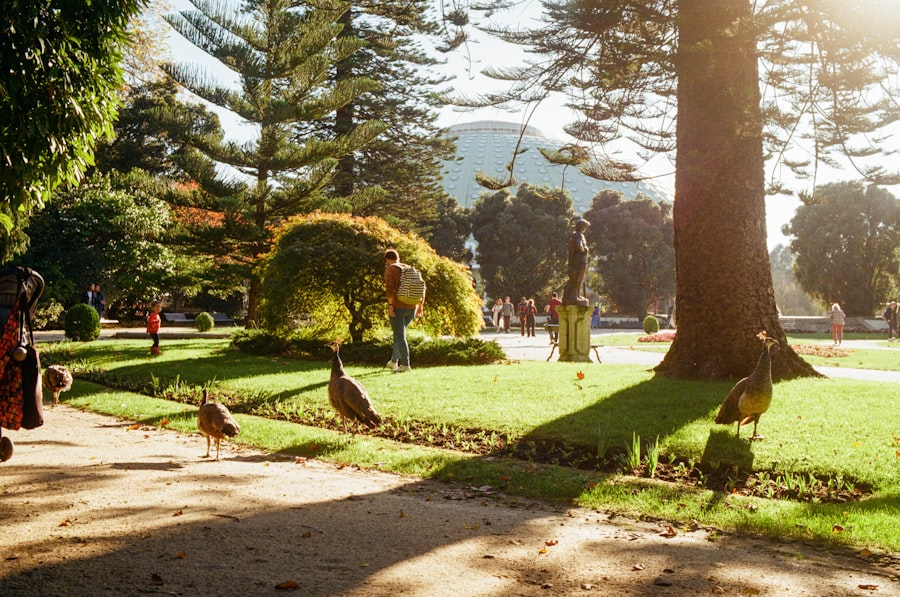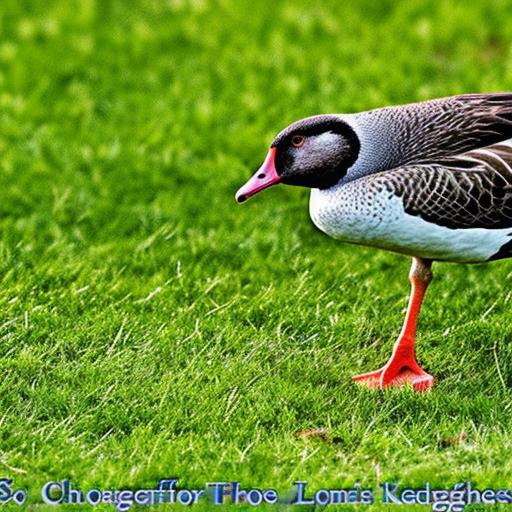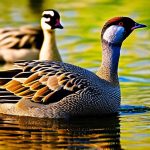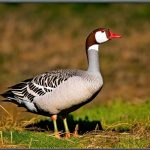Having geese on your lawn can be a nuisance and cause a variety of problems. From damaging your grass and plants to creating noise and aggression, geese can disrupt the peacefulness of your outdoor space. In this article, we will explore the different issues that geese can cause on your lawn and provide strategies for keeping them away. We will discuss the behavior of geese, the dangers of their droppings, and various methods for deterring them. By understanding these factors and taking action, you can maintain a goose-free lawn and enjoy your outdoor space to the fullest.
Key Takeaways
- Geese can cause damage to lawns and pose health risks due to their droppings.
- Understanding geese behavior can help in finding effective solutions to keep them away.
- Geese droppings can contain harmful bacteria and parasites that can cause illness in humans and pets.
- Natural deterrents like planting certain types of vegetation or using decoys can help keep geese away.
- Installing physical barriers like fences or netting, and using sound and light devices can also be effective in repelling geese.
The Problem with Geese on Your Lawn
One of the main issues with geese on your lawn is the damage they can cause to your grass and plants. Geese are known for their grazing behavior, which involves pulling up grass and eating it. This can result in patches of bare soil and damaged turf. Additionally, their constant presence can lead to compaction of the soil, making it difficult for new grass to grow.
Another problem with geese on your lawn is the noise they create. Geese are not known for being quiet animals, especially when they are in a group. Their honking can be loud and disruptive, particularly if you live in a residential area where noise levels need to be kept to a minimum.
Geese can also display aggressive behavior, especially during nesting season. They may become territorial and attack humans or other animals that come too close to their nests. This aggression can pose a risk to children or pets who may unknowingly approach a nesting goose.
Understanding the Behavior of Geese
To effectively deal with geese on your lawn, it is important to understand their behavior and what attracts them to certain areas. Geese are attracted to open spaces with easy access to water and food sources. They prefer areas with short grass where they can easily spot predators.
Geese may choose to stay on your lawn for a variety of reasons. It could be because they have found a reliable food source, such as an abundance of grass or nearby agricultural fields. They may also be attracted to the presence of water, such as a pond or lake, where they can swim and find food.
Additionally, geese are social animals and tend to gather in large groups. If one goose finds your lawn to be a suitable habitat, others may follow. This can create a cycle where geese continue to return to your lawn year after year.
The Dangers of Geese Droppings
Geese droppings can pose health risks and cause damage to your lawn and property. Geese droppings can contain bacteria, parasites, and viruses that can be harmful to humans and pets. These include E. coli, salmonella, and giardia. If you or your pets come into contact with geese droppings and then touch your face or mouth, you can become infected.
In addition to the health risks, geese droppings can also damage your lawn and property. The high nitrogen content in their droppings can burn the grass and leave unsightly brown patches. The droppings can also create an unpleasant odor and attract other pests such as flies.
How to Keep Geese Away from Your Lawn
There are several strategies you can employ to keep geese away from your lawn. One of the most effective methods is to remove any food sources that may be attracting them. This includes not feeding them directly and ensuring that any bird feeders or pet food is not accessible to geese.
Making your lawn less attractive to geese is another way to deter them. This can be done by keeping the grass longer, as geese prefer short grass where they can easily spot predators. Planting tall shrubs or trees around the perimeter of your lawn can also create a barrier that geese are less likely to cross.
Another strategy is to use visual deterrents such as reflective tape or scarecrows. These can create movement and noise that will scare geese away. Additionally, using motion-activated sprinklers can startle geese and make them think twice about landing on your lawn.
Natural Deterrents for Geese

There are several natural deterrents that can be used to keep geese away from your lawn. One option is to plant certain types of plants that geese find unappealing. These include tall grasses, prickly shrubs, and plants with strong odors such as lavender or rosemary.
Another natural deterrent is the use of decoys. Placing decoy predators such as plastic owls or coyotes on your lawn can make geese think twice about landing. It is important to move the decoys regularly to prevent geese from becoming accustomed to them.
Installing Physical Barriers to Keep Geese Out
Physical barriers such as fences or netting can be effective in keeping geese away from your lawn. Fences should be at least three feet high and have small openings to prevent geese from squeezing through. Netting can be installed over ponds or other water features to prevent geese from swimming and feeding.
While physical barriers can be effective, they may not be suitable for all situations. They can be expensive to install and may not be aesthetically pleasing. Additionally, they may not be practical if you have a large lawn or multiple entry points for geese.
Using Sound and Light to Repel Geese
Sound and light can be used as effective deterrents to repel geese from your lawn. There are devices available that emit loud noises or flashing lights when geese approach. These devices mimic the sounds and movements of predators, scaring geese away.
Ultrasonic devices are another option. These emit high-frequency sounds that are unpleasant to geese but not audible to humans. They can be placed around your lawn to create a sonic barrier that geese will avoid.
The Benefits of Hiring a Professional to Deal with Geese
If you are struggling to keep geese away from your lawn, it may be beneficial to hire a professional to deal with the problem. Professionals have experience and knowledge in dealing with geese and can provide effective solutions tailored to your specific situation.
A professional may offer services such as habitat modification, which involves making your lawn less attractive to geese. They may also use non-lethal techniques such as harassment or relocation to deter geese from your property. Additionally, professionals can provide ongoing maintenance and monitoring to ensure that geese do not return.
How to Maintain a Goose-Free Lawn
Once you have successfully deterred geese from your lawn, it is important to maintain a goose-free environment. Regular cleaning and maintenance are key to preventing geese from returning. This includes removing any food sources, such as fallen fruit or bird feeders, and regularly cleaning up any droppings.
Consistency is also important. Geese are creatures of habit and will return to areas where they have previously found food or shelter. By consistently implementing deterrents and maintaining a goose-free environment, you can prevent geese from returning to your lawn.
Enjoying Your Lawn Without Geese
Maintaining a goose-free lawn has many benefits. You can enjoy a clean and healthy outdoor space without the damage and noise caused by geese. You can also feel confident knowing that you are reducing the health risks associated with geese droppings.
To fully enjoy your goose-free lawn, consider creating a welcoming environment for other wildlife. Plant native flowers and shrubs that attract butterflies and birds. Install bird feeders or birdhouses to encourage other species to visit your yard. By creating a diverse and vibrant ecosystem, you can enjoy the beauty of nature without the hassle of geese.
Having geese on your lawn can be a problem, but with the right strategies, you can keep them away and enjoy a goose-free environment. By understanding the behavior of geese, the dangers of their droppings, and various deterrent methods, you can effectively deter geese from your lawn. Whether you choose to implement natural deterrents, install physical barriers, or use sound and light to repel geese, consistency is key. By maintaining a goose-free lawn, you can create a peaceful and enjoyable outdoor space for yourself and your family.
If you’re tired of dealing with geese invading your lawn, there’s a helpful article on Poultry Wizard that offers some effective solutions. From installing decoy predators to using motion-activated sprinklers, this article provides practical tips to keep geese away from your property. For more information, check out the article here. While you’re at it, don’t forget to explore other interesting articles on Poultry Wizard, such as how many chickens you need for a family of 4 and do quails sit on their eggs. Additionally, if you’re considering raising chickens but don’t have the space, you might want to look into the option of renting a chicken coop.
FAQs
What are the common reasons for geese to invade lawns?
Geese are attracted to lawns because they provide a source of food, water, and shelter. They also prefer open spaces where they can easily spot predators.
What are the negative effects of geese on lawns?
Geese can cause damage to lawns by eating grass, leaving droppings, and creating nests. Their droppings can also be a health hazard and can make the lawn unsightly.
What are some effective ways to keep geese off lawns?
Some effective ways to keep geese off lawns include using decoys, installing fencing or netting, using repellents, and creating barriers such as hedges or shrubs.
Are there any natural ways to keep geese off lawns?
Yes, there are natural ways to keep geese off lawns such as planting tall grasses or using natural predators like dogs or hawks.
Is it legal to harm or kill geese to keep them off lawns?
No, it is not legal to harm or kill geese unless it is done under specific circumstances such as hunting season or if they pose a threat to public safety. It is important to check with local laws and regulations before taking any action.
Meet Walter, the feathered-friend fanatic of Florida! Nestled in the sunshine state, Walter struts through life with his feathered companions, clucking his way to happiness. With a coop that’s fancier than a five-star hotel, he’s the Don Juan of the chicken world. When he’s not teaching his hens to do the cha-cha, you’ll find him in a heated debate with his prized rooster, Sir Clucks-a-Lot. Walter’s poultry passion is no yolk; he’s the sunny-side-up guy you never knew you needed in your flock of friends!







